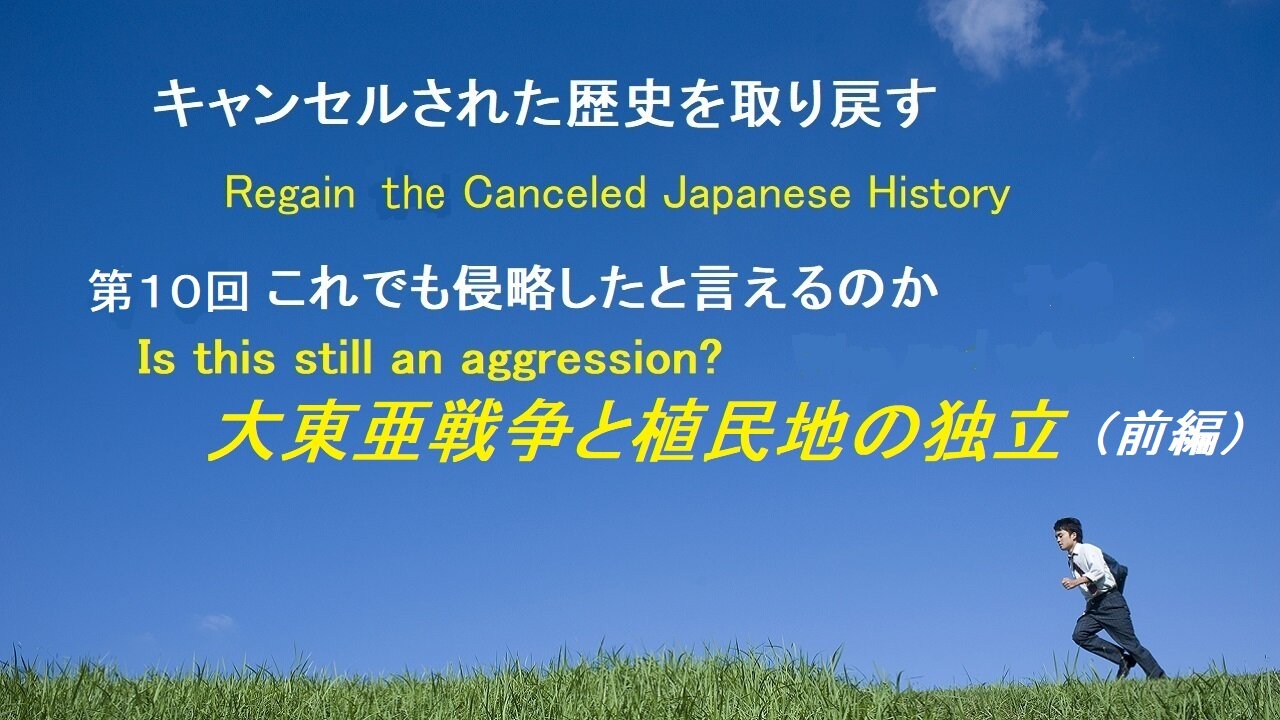Premium Only Content

"Regain the canceled Japanese history" the Greater East Asia War and the independence of Asia
The Second World War began in September 1939, when Germany invaded Poland and Britain and France declared war on Germany. This was the beginning of the war in Europe.
It was more than two years later that Japan fought against Britain, the United States, the Netherlands and Australia in the Pacific Indian Ocean.
During this time, the war between Japan and Chiang Kai-shek continued on the continent, but it was down. However, the pressure of Britain and the United States on Japan is increasing day by day.
The Japanese war at this time was called the Pacific War or the War of Aggression, which is what we have been taught in schools.
And textbooks other than Jiyusha do not say that the Japanese war wiped out Asian colonies. The beginning of Japan's invasion of China was the Manchurian Incident, the beginning of Japan's invasion of Korea was the annexation of Korea, and so on.
However, these can be said to be the views of China, Britain, the United States, and the Korean side.
They seem to be political propaganda to benefit these countries, to make the Japanese people feel guilty, to keep them weak and to extract profits from them.
I have already mentioned in the Japanese-Sino War that the Chiang Kai-shek administration started a war on Japan.
In 1898, the United States took control of the Philippines, and before that, the British ruled India and the Malay Peninsula, while the Dutch ruled Indonesia as a colony by force.
They were forced to work like slaves for low wages by Western. Japan may well have been colonised by the West in the Edo period or even before.
It wasn't that we were lucky, but only because our ancestors were strong and wise.
After the Japanese-Sino War, the Japanese-Russo War and the First World War, Japan emerged as a powerful military power in the international community.
Britain, the United States and the Soviet Union began to fear and be wary of this. But they knew that Japan's weakness was energy - oil.
In the event of an emergency, they must have thought that if they stopped exporting oil to Japan, the warships and planes would not move and Japan would be forced to do what they said.
When war broke out, it would little more than a skirmish, and they would never have dreamed of ending their colonial rule.
Japan proposed the elimination of racial discrimination at the Paris Peace Conference after World War I in 1919 and 1919.
Japan was the first in history to appeal for the elimination of such racial discrimination at an international conference.
The colonial rule of Britain and the United States naturally disagrees, and the United States in particular crushes this proposal. At that time, Japanese people were not treated as well as white people.
Apartheid and racism were the norm in both African and Asian colonies. At that time, there was a strong opinion that "the League of Nations does not need to participate."
In 1924, the United States enacted the Immigration Act of 1924, which bans Japanese immigrants, and Japan's sentiment toward the United States worsened.
We were victorious in the First World War when we sent a destroyer fleet to the Mediterranean to escort British merchant ships away from German U-boats, and attacked and occupied the German forces in Tsingtao.
At this time, Japanese companies and individuals were becoming economically powerful and were expanding into the South Pacific, where they had inherited German interests, and Malaysias, Indonesia and the Philippines.
As a result, Japan became very wary of the overseas Chinese, who had already established themselves as a major commercial power, and of the Western colonial powers in Southeast Asia.
They used the Manchurian Incident and the subsequent establishment of Manchuria for anti-Japanese promotion. Overseas Chinese are Chinese who have emigrated overseas while remaining Chinese.
There was such an example. Malaysia was a British colony, so it was called British Malaya, usually Malay.
Tani Yutaka, then three years old, and his Japanese family had also moved from Fukuoka Prefecture to Terengganu, the capital of the southern state of the Malay Peninsula, where they ran a dry cleaning and barber shop.
When the Manchurian Incident occurred, it was used as a pretext for anti-Japanese sentiment in Trenganu, and overseas Chinese began to attack Japanese shops, looting and throwing stones.
It was November 1932, Yutaka had returned to Japan for a draft check and his young sister was lying alone with a cold. Tragedy struck at this time.
-
 17:17
17:17
DeVory Darkins
19 hours agoKamala Post-Election BOMBSHELL Exposes $1 BILLION Campaign DISASTER
31.7K111 -
 19:52
19:52
Stephen Gardner
23 hours ago🔥HOLY CRAP! Trump just did the UNTHINKABLE!!
44.7K417 -
 4:34:55
4:34:55
Pepkilla
7 hours agoBlackops Terminus Zombies Boat Glitch
115K6 -
 5:50
5:50
CapEx
19 hours ago $22.92 earnedWhat the Coming & Inevitable Sovereign Debt Crisis Means for YOU | CapEx Insider
108K25 -
 1:34:00
1:34:00
Tactical Advisor
8 hours agoAR15 Giveaway WINNER/Trump Winning | Vault Room Live Stream 008
73.2K26 -
 5:41:10
5:41:10
Vigilant News Network
9 hours agoOfficials CAUGHT Changing Ballots in Arizona | The Daily Dose
122K64 -
 17:30
17:30
Forrest Galante
1 day ago5 Most Dangerous Invasive Species in the World
91.2K52 -
 38:53
38:53
Popcorn In Bed
1 day agoTOP GUN: MAVERICK | FIRST TIME WATCHING | MOVIE REACTION
103K21 -
 0:56
0:56
scoutthedoggie
1 day agoAirsoft Tracer Wars
95.7K19 -
 10:23
10:23
Space Ice
1 day agoSteven Seagal's Urban Warfare Is A Real Movie, I Promise - Worst Movie Ever
71.8K34